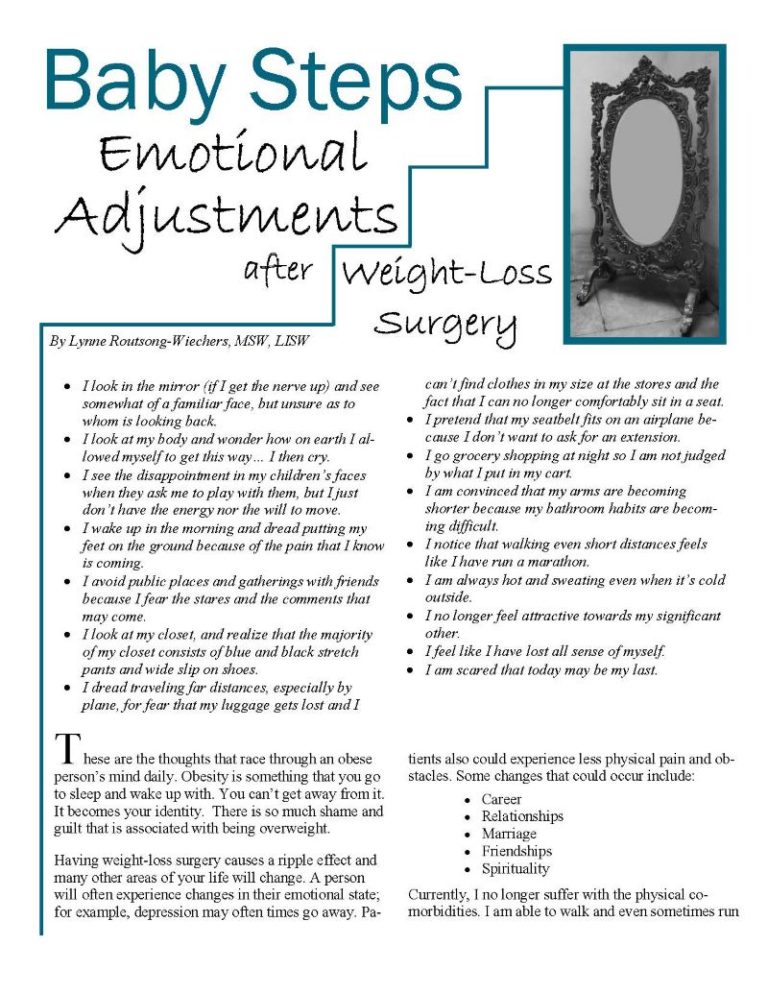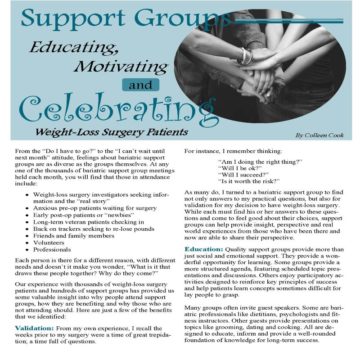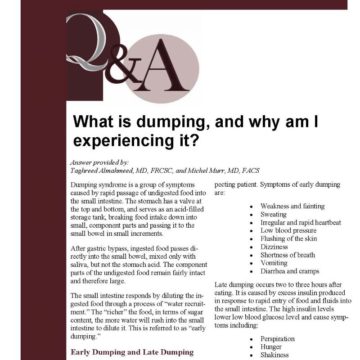Baby Steps – Emotional Adjustments after Weight-Loss Surgery


By Lynne Routsong-Wiechers, MSW, LISW
Summer 2006
These are the thoughts that race through a person with obesity’s mind daily. Obesity is something that you go to sleep and wake up with. You can’t get away from it. It becomes your identity. There is so much shame and guilt that is associated with being overweight.
- I look in the mirror (if I get the nerve up) and see somewhat of a familiar face, but unsure as to whom is looking back.
- I look at my body and wonder how on earth I allowed myself to get this way… I then cry.
- I see the disappointment in my children’s faces when they ask me to play with them, but I just don’t have the energy nor the will to move.
- I wake up in the morning and dread putting my feet on the ground because of the pain that I know is coming.
- I avoid public places and gatherings with friends because I fear the stares and the comments that may come.
- I look at my closet, and realize that the majority of my closet consists of blue and black stretch pants and wide slip on shoes.
- I dread traveling far distances, especially by plane, for fear that my luggage gets lost and I can’t find clothes in my size at the stores and the fact that I can no longer comfortably sit in a seat.
- I pretend that my seatbelt fits on an airplane because I don’t want to ask for an extension.
- I go grocery shopping at night so I am not judged by what I put in my cart.
- I am convinced that my arms are becoming shorter because my bathroom habits are becoming difficult.
- I notice that walking even short distances feels like I have run a marathon.
- I am always hot and sweating even when it’s cold outside.
- I no longer feel attractive towards my significant other.
- I feel like I have lost all sense of myself.
- I am scared that today may be my last.
Having weight-loss surgery causes a ripple effect and many other areas of your life will change. A person will often experience changes in their emotional state; for example, depression may oftentimes go away. Patients also could experience less physical pain and obstacles. Some changes that could occur include:
- Career
- Relationships
- Marriage
- Friendships
- Spirituality
Currently, I no longer suffer with the physical co-morbidities. I am able to walk and even sometimes run around the yard with my children. I even got on a bike! I no longer suffer from depression and my energy level is off the charts. After having undergone my surgery, I realized that many people don’t truly understand what its like to be affected by obesity unless they walked in our shoes.
Patients with obesity need a voice and they need to be heard. I decided to open up a counseling practice specifically for gastric bypass patients and obesity-related issues. I see the relief in my patients’ eyes when they see my pre-surgery picture and realize that, “I have walked in their shoes.” There is so much shame and guilt that is associated with being overweight. I try to encourage my patients to let the guilt go and focus on the reality that they will lead a very different life after surgery.
The Changes: This is Not the Easy Way out.
We dream about it. We think about it. We almost become obsessed with the thoughts of being a healthy person. It sometimes keeps us up a night. We finally see the light at the end of the tunnel and realize that we will get there. We wait for weeks sometimes months for that “letter.” You know which one I am talking about – the letter from the insurance company. Then one day you go to the mailbox and there it is. You realize that it’s now a reality! All of the preparation has paid off, but now the reality of what is about to happen sets in.
Getting patients to realize that weight-loss surgery is not the easy way out is essential in successful weight-loss. Regardless of what we hear in the media and from society, this is not easy. Deciding to have this surgery is difficult, but living as a weight-loss surgery patient is not always easy.
Fear of the Unknown: “Baby Steps”
Although we are looking for a change in our lives, change can be scary and unknown. Many of us fear change, but at the same time look forward to it. I can’t tell you how many times patients, including myself, ask themselves, “why did I do this,” right after surgery. Most often this emotion is short-lived, but it’s an example of how change can affect us.
I realized that I was no longer going to allow food to control me. Food issues become an addiction and we must learn that we no longer live to eat, but instead we eat to live.
In addition, we all go through a phase where you have a difficult time realizing the new you. For example, although patients may reach their goal weight, they may look in the mirror and ask themselves, “who is that thin person?” Losing a massive amount of weight can make a person feel vulnerable and afraid. Remember, individuals with obesity like to “blend in” with the crowd, but all of a sudden we are now the focus of attention. People are watching us. They are now watching what we eat, asking us how much we have lost and even giving us compliments. This can make us feel uncomfortable.
I call it taking “baby steps.” We are re-learning who we are in life. In relation to baby steps, we have to re-learn how to eat according to our surgery. We have to adjust to:
- Eating smaller portions
- Chewing food to a pulp
- Not drinking while eating
- Avoiding high sugar and fatty foods
- Changing our eating behaviors for good
Food is a central part of our life. If you’re an alcoholic, the cure for alcoholism is to stop drinking. Unfortunately, we need food for survival. Food issues become an addiction and we must learn that we no longer live to eat, but instead we eat to live. It took me a long time to understand this concept. There were so many things in my life related around food. I realized that I was no longer going to allow food to control me.
What’s in my Toolbox: “Surgery as a Tool”
Weight-loss surgery is a great tool. This means that it is not the fix all, but if you correctly use the tool then you will have increased chances of success. If you choose to misuse the tool, then chances are you will have less success. This surgery will enable you to only eat small portions and feel a sense of fullness.
Although this sounds so “simple” it can be difficult. In addition, we go through phases where we long for food. This is also known as “food grief.” It is as if we long for our “friend” of food. We turn to food in times of celebration, sadness, for reward and for comfort. When a person can no longer turn to food to fill the void, they must find other ways.
Many of my patients, including myself, find other hobbies or activities. In addition, this is when bariatric support groups become so helpful and beneficial.
Seven Steps to Improving Emotional Adjustments Post-Surgery
1. Follow your doctor’s orders and recommendations. This means following the dietary changes from the start. Get lots of rest and take care of your physical needs.
2. Journal. I know what you are thinking. Journaling is boring and tedious and we don’t like it, right? By keeping track of the foods you eat and how you feel will truly help you feel more in control emotionally and physically. This is especially helpful if you find that you are emotionally eating.
3. Set realistic goals and expectations. For many, goals may be getting off their medication(s), walking without getting winded or the ability to cross their legs. So whatever your goals are make sure that you write them down and modify them as needed.
4. Reflect on the past. Although it is important to move on, it’s also important for patients to remember the moment when they decided to have weight-loss surgery. It’s sort of like we have to hit our “low or bottom” to realize that we have to change.
5. Take lots of pictures, measurements and keep your pants. It is important that we take pre-op pictures and post-op pictures regularly. This reminds us about our success. Measurements and pre-op clothing are important especially during the dreaded plateaus. We may be losing inches and it’s important that we have visual aids to help us realize our success. Although you may be a smaller size, you may still view yourself as the larger you. It’s important to have a visual reference point to remind us that we are losing weight.
6. Seek help. It is important to ask for help if you find that you are having difficulty adjusting to the many changes after surgery. Seek support via support groups, family, friends and/or professional counseling. Support groups and counseling are especially rewarding and helpful because we realize that many patients often experience the same adjustment issues and it makes us feel less isolated and alone while we travel our journey.
7. Live life to the fullest. You deserve to be healthy, happy and have fun! Enjoy and savor every moment of your weight-loss journey. You deserve it.
Lynne’s Story
I was 285 pounds at 5’4” tall. I had tried every diet known to man, including rigorous exercise programs, usually ending up with only a five to 10-pound weight-loss. I realized that my weight gain was not going to stop.
Physically, I was hurting. Emotionally, I suffered from depression, and my career became a struggle. I was counseling in a private practice but barely had the energy to see three patients per day, often having to take a nap in between. I came to the realization that “I” was the one who needed to gain control and get help. That’s a tall order coming from a psychotherapist. After all, we are the ones who are supposed to be helping others. I swallowed my pride and decided to take control of my life. I wanted to be free; free of this body and free to “live” life, not just exist.
I began living my new life three years ago. I underwent gastric bypass surgery in Dayton, Ohio and have not looked back. I lost 160 pounds and went from a size 24 to a size 4/6. My whole life has changed.
About the Author:
Lynne Routsong-Wiechers, MSW, LISW, has worked in private practice counseling since 1996. She underwent gastric bypass in 2003 and has dedicated her practice to working with gastric bypass and obesity patients. She is currently a Bariatric Psychotherapist in Dayton, Ohio, providing consultation to medical professionals and speaking to the public regarding gastric bypass.
by Robyn Pashby, PhD Winter 2024 “No one is ever going to date you if you don’t…
Read Articleby Kendall Griffey, OAC Communications Coordinator Winter 2024 The Obesity Action Coalition’s 12th annual Your Weight Matters…
Read Articleby Nina Crowley, PhD, RD (with Inspiration from Shawn Cochran) Winter 2024 Dating, no matter your age,…
Read Article








